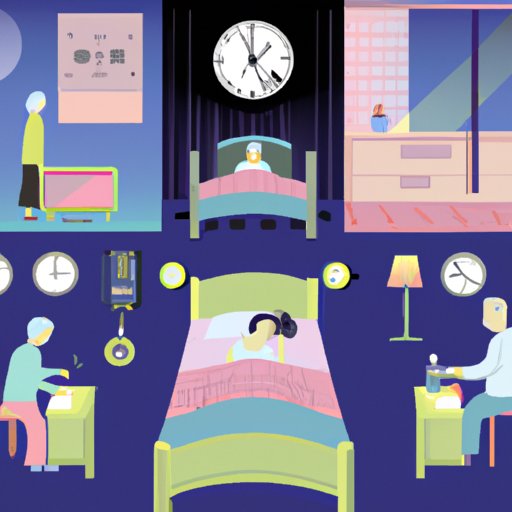Introduction
Dementia is a group of cognitive impairments that affects an individual’s ability to think, remember, and reason. It can cause confusion and disorientation, as well as behavioral changes such as restlessness and wandering. As a result, it can be difficult to keep dementia patients in bed at night.
It is important to provide a safe and comfortable sleeping environment for dementia patients, as this can help reduce their risk of falls, injury, and other health complications. This article will explore how to keep dementia patients in bed at night by utilizing bright lighting, creating a comfortable sleeping environment, establishing a regular bedtime routine, encouraging physical activity, providing calming activities, using white noise or sound machines, and offering reassurance.
Utilizing Bright Lighting
Bright lighting can be effective in helping dementia patients stay in bed at night. During the day, exposing them to natural sunlight can help regulate their body clock and make them more alert. At night, dimming the lights can help signal to their brains that it is time to go to sleep. Additionally, installing nightlights throughout the house can help them find their way around if they get up during the night.
Bright lighting can also help dementia patients maintain their sense of orientation and reduce confusion. By keeping their environment well-lit, they can better orient themselves and have an easier time finding their way back to bed if they get up during the night.

Creating a Comfortable Sleeping Environment
Creating a comfortable sleeping environment is essential for keeping dementia patients in bed at night. Reducing distractions such as loud noises and bright lights can help them relax and fall asleep more easily. Additionally, ensuring that their beds are comfortable and secure can help them feel safe and relaxed, which can encourage them to stay in bed.
It is also important to ensure that the bedroom is free from any potential hazards. Removing loose rugs, cords, and furniture can help prevent falls and injuries. Additionally, providing easy access to the bathroom can help reduce the need to get out of bed during the night.
Establishing a Regular Bedtime Routine
Having a regular bedtime routine can be beneficial for dementia patients. Establishing a consistent schedule can help them adjust to the transition from day to night and make it easier for them to fall asleep. Additionally, having a predictable routine can provide comfort and security, which can encourage them to stay in bed.
Tips for creating a bedtime routine include keeping the same bedtime and wake up time every day, avoiding caffeine and heavy meals late at night, engaging in calming activities such as reading or listening to music before bed, and limiting screen time before bed.
Encouraging Physical Activity
Physical activity can be beneficial for dementia patients in many ways. Exercise can help improve their physical and mental wellbeing, as well as reduce their risk of falls and injuries. Additionally, it can help them maintain a healthy body weight, which can make it easier for them to stay in bed at night.
Ideas for activities include taking walks, doing light stretching, swimming, dancing, and playing simple games such as bowling or golf. It is important to note that physical activity should be tailored to the individual’s abilities and preferences.
Providing Calming Activities
Calming activities such as listening to music, reading, or doing puzzles can be beneficial for dementia patients. These activities can help reduce anxiety and restlessness, as well as promote relaxation and sleep. Additionally, engaging in these activities during the day can help them stay in bed at night.
It is important to tailor the activities to the individual’s preferences and abilities. For example, some individuals may prefer listening to classical music, while others may enjoy reading or doing jigsaw puzzles. Additionally, it is important to provide guidance and support when needed.

Using White Noise or Sound Machines
White noise or sound machines can be helpful in keeping dementia patients in bed at night. The sound of white noise is soothing and can help block out distractions, making it easier for them to fall asleep. Additionally, sound machines can help reduce anxiety and restlessness, which can encourage them to stay in bed.
When using a sound machine, it is important to keep the volume low and avoid using any jarring or loud noises. Additionally, it is important to check in with the individual to ensure that the sound is not too overwhelming or disruptive.
Offering Reassurance
Providing comfort and reassurance to dementia patients can be beneficial in keeping them in bed at night. Offering words of encouragement and support can help ease anxiety and promote a feeling of safety and security. Additionally, providing physical contact such as hugs or hand-holding can be comforting and can help reduce restlessness.
It is important to be patient and understanding when offering reassurance. Additionally, it is important to recognize that different individuals may require different levels of support, and it is important to tailor the approach to the individual’s needs and preferences.
Conclusion
Keeping dementia patients in bed at night can be challenging, but there are several strategies that can be used to help. Utilizing bright lighting, creating a comfortable sleeping environment, establishing a regular bedtime routine, encouraging physical activity, providing calming activities, using white noise or sound machines, and offering reassurance can all be beneficial in helping dementia patients stay in bed at night.
It is important to remember that each individual is unique and may require different approaches. Additionally, it is important to provide support and reassurance to help ease anxiety and promote a feeling of safety and security.


